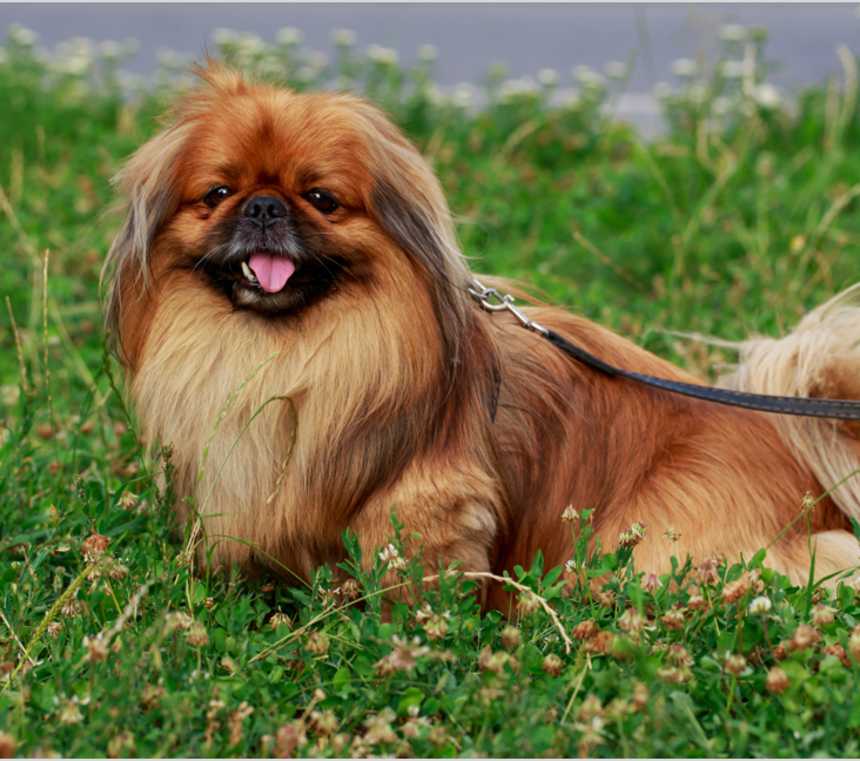Are Pekingese healthy dogs?

Pekingese are generally healthy dogs but, like all breeds, may experience some health issues. Diseases to watch out for include:
- Intervertebral disc disease: Intervertebral disc disease causes a bulge or rupture in the discs between the vertebrae, which can cause pain, nerve damage, and paralysis. Sometimes, the disease is mild and may be relieved through crate rest and medication, but dogs with severe cases could need surgery or to use a wheelchair cart. If a Pekingese is having trouble walking, refuses to jump, is incontinent, won’t eat, or appears anxious, they should be taken to the vet as soon as possible.
- Patellar luxation: Also known as slipped kneecaps, patellar luxation is a common problem in many dog breeds. It occurs when slight abnormalities cause the knee joint to slide in and out of place, which can cause pain and occasional lameness. Surgical treatment is available for severe cases, although many dogs lead normal lives without treatment.
- Brachycephalic syndrome: This disorder is found in dogs with short heads, narrowed nostrils, and/or elongated soft palates. Their body structure causes breathing obstructions to varying degrees and can result in anything from noisy or labored breathing to total collapse of the airway. Dogs with brachycephalic syndrome commonly snuffle and snort. Treatment varies depending on the severity of the condition but includes oxygen therapy as well as surgery to widen nostrils or shorten palates.
- Elongated soft palate: Though the Pekingese’s snout is a bit shorter than other breeds, the soft palates (and tongue) at the back of their mouths are not shortened. A dog of the same size with a normal head shape would have a soft palate of the correct length, but in the brachycephalic dog, like the Pekingese, the overlong soft palate is pushed backward, partly obstructing the larynx (the opening to the airway). An elongated soft palate also causes issues with airflow and rubs against other tissues, leading to inflammation and swelling of airway tissues. The inflammation often makes the soft palate itself become swollen and thickened over time, further blocking your Pekingese’s ability to breathe properly.
- Legg-Calve-Perthes: This condition causes the head of the femur (located in a dog’s hind leg) to spontaneously degenerate. Over time, this will lead to erosion of the hip joint and arthritis. Pekingese suffering from Legg-Calve-Perthes will become lame, limp while walking, and experience pain when moving the hip joint. Surgery is the most effective treatment for the disorder.
- Eye issues: Pekingese may experience certain eye conditions such as entropion, a genetic defect where one or both eyelids are inverted or roll inward and rub on the surface of the eye; distichiasis, an abnormal growth of eyelashes on the margin of the eye, the extra eyelashes and abnormal location result in irritation to the eye; dry eye; cataracts, a common eye condition that causes cloudiness in the eye and obstructs vision; and trichiasis, a condition characterized by the eyelashes turning inward resulting in irritation and inflammation.
- Others: Pekingese may also experience mitral valve disease, a condition where the valve directing blood from the left atrium to the left ventricle begins to fail and eventually leads to heart failure; fold dermatitis, a skin infection caused by the folds of the skin rubbing against each other and creating excessive moisture; and hydrocephalus, a build up of fluid in the brain that is most commonly seen in puppies under 18 months of age.